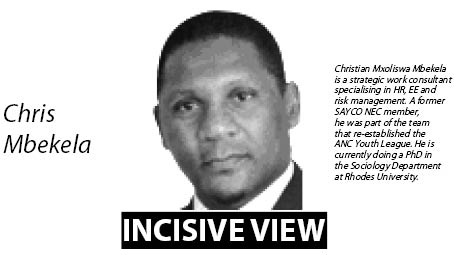It is a matter of hours before the watershed national elective conference of the ANC – a party in distress, yearning for leadership with the ability to rise to the challenge.
The electoral hype is written on the faces of followers, convinced that their presidential hopefuls will grab the coveted position. The contest is around the party’s presidency. It is for the first time in the ANC that no fewer than seven contestants are eying the presidency. Campaigns leading to the “life and death” conference revolve around individuals.
Contestants have gained prominence than their party, which has been subordinated to personality cult – a politics with the potential to build an individual bigger than the party. Individuals subscribe to a single leader in the hope that after power has been grabbed, payback time will come.
The support given to each contestant is informed by this expectation and their campaigns resemble US politics. ANC’s outgoing leaders should ask themselves why they allowed members to organise themselves into structured factions. Their inaction gives the impression they are powerless to address the problem. If they cannot annihilate this, what power do they have to address growing inequalities, obscene poverty and unemployment? Leaders have become mute on the need to address past legacies. The party was voted to power because of promises made.
Factions thrive on divisions for self aggrandisement. The NDZ17 and CR17 paradox will continue after the conference. Party list processes for deployment will be contested along factional lines.
Whoever wins the presidency won’t be able to unite the party before 2019 elections. It is a myth to think that a venomous situation will be turned around in such a short space of time. ANC is contested within by competing interests and this extends externally: opponents of the ANC won’t give it space to reposition itself.
This does not mean the party can’t recover. But how it’s going to deal with matters that may lead to jail for some? The execution of the law is status blind. One expects tensions to escalate during and after the conference. People should not read too much into support garnered during the nomination processes. Many variables are used to change the balance of support.
The Eastern Cape was once a springboard for the advancement of sectarian politics in the name of progressiveness. This development annoyed even Mandela.
Now this phenomenon has been institutionalised. Young people who have just entered politics have become victims of this mediocrity that has the potential to stagnate cognitive creativity and innovation.
To save itself from decay, the party should have heeded the call to convene a non-elective conference to dissect the state of the party. The call was ignored because it could have frustrated the self-serving political ambitions of certain individuals.
It could also have dealt with external interests that enjoy hegemony in the country. Turning down the noble idea of a non-elective conference will haunt the outgoing leaders forever.
Leaders propelled to power through factionalism have no choice but to reciprocate. Failing to do so could lead to silent political sabotage.
The outcome of the conference may not bring about fundamental change. To be fair to whoever wins: the problems are too big to be resolved by one party.
- Christian Mxoliswa Mbekela is a strategic work consultant specialising in HR, EE and risk management. A former SAYCO NEC member, he was part of the team that re-established the ANC Youth League. He is currently doing a PhD in the Sociology Department at Rhodes University.



